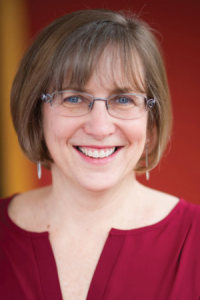Get to know: Laurie Ewert-Krocker
 When and with which trainer did you do your original 6-12 training?
When and with which trainer did you do your original 6-12 training?
Kay Baker was officially my 6-12 trainer, but I took a three-summer course (1994-1996) that brought many 6-12 trainers together for a collaborative experience—and I am so grateful for the combined expertise of Greg MacDonald, Peter Gebhardt-Seele, Jean Miller, and Jenny Hoglund. I also trained at the 3-6 level under Hildegard Solzbacher and Joen Bettmann.
How did you arrive at the decision to become an AMI trainer?
I contributed to the AMI-NAMTA Orientation to Adolescent Studies for 16 years as a presenter and then a Course Director. As the 12-18 work began to transition to a full AMI diploma level, becoming a trainer was the logical step to helping the work move forward and to developing the expertise needed to support schools and practitioners who are called to serve adolescents.
What training are you currently delivering?
I am currently directing an AMI 12-18 Diploma Course.
When not delivering training, what other parts of the trainer role do you get involved with?
I organize and offer workshops like the AMI Introduction to Adolescence, the AMI 12-18 Orientation, as well as webinars and professional gatherings for Montessori practitioners who work with adolescents.
What do you most enjoy about the training process?
Montessori offers such an inspiring vision for what’s possible in supporting the development of children and adolescents. What I love about working with adults is helping them to see how that vision can translate into the place and community where they live and work.
What are some of the challenges you have faced in being a trainer?
My challenge as a new trainer has been–being a new trainer! Committing to delivering courses and workshops that meet the high standards of AMI for authentic Montessori is an honour and a call to deepen my work in every way. Adolescents need this work, and practitioners need the work to be principled and effective.
What are you most looking forward to in your training work throughout the year?
The privilege of meeting and working with people from all over the world in online courses and workshops has been delightful and inspiring; however, my heart and passion lie in living the experience of social organization and genuine community in person with diploma course students. There is inevitably an “Ah-Ha!” effect when the course students live, work, and study together as adolescents do in a Montessori environment for 12-18-year-olds. That revelation never loses its power for me.
What words of advice can you offer anyone considering studying for an AMI 12-18 Diploma?
The work of training in an AMI course aims at nothing short of the “transformation of the adult.” One must be prepared to be challenged in their thinking and their expectations about what education looks like for adolescents. Study, observation, experience, debate, research, experimentation, problem-solving, living in community—one is invited to engage in all of these ways of learning and relearning during an AMI 12-18 diploma course. One can expect to work hard toward “transformation”; at the same time, authentic growth, engagement, energy for new ways of being, a drive for creative endeavours, and passion for positive change is exactly what the adolescent has to offer us and our hope for the future when we shift our lens to a Montessori way of aiding life.
What words of advice can you offer anyone considering applying for the AMI Training of Trainers program?
Becoming a trainer invites a deepening of study and understanding of human development and a call to analyse and integrate the principles and practices of Montessori work—which turns out to be a lifelong work. It engages an ongoing personal and professional transformation necessary to coach and support adults in their learning process. It requires coming to understand authentic leadership and dynamic collaboration with diploma course students as both colleagues and mentees. Becoming a trainer is not about gaining authority. It is about serving the adults who aid the life of the children.
